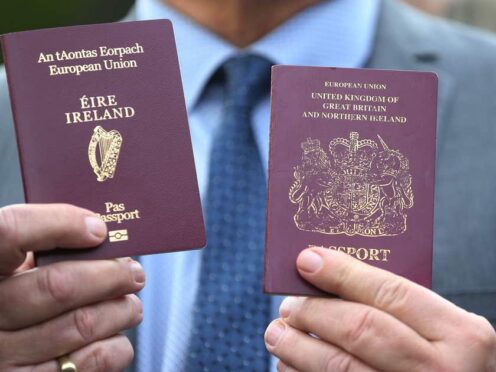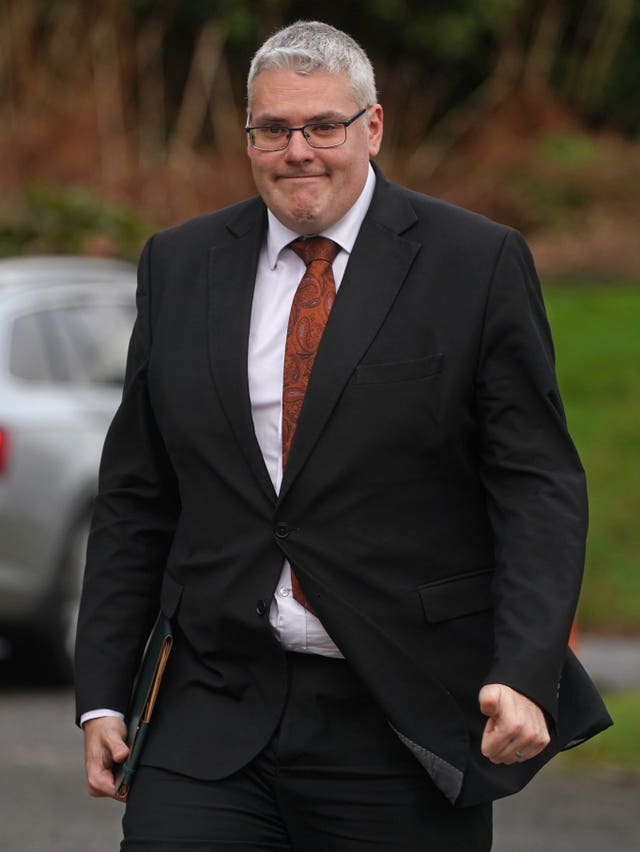
A Bill that would make it easier for people from the Republic of Ireland to become British citizens has moved closer to becoming law.
The British Nationality (Irish Citizens) Bill, introduced by interim leader of the DUP Gavin Robinson, cleared the House of Commons on Friday after receiving support from Government and Opposition benches at third reading.
The legislation would allow Irish people to acquire British citizenship by registration after five years’ residence without having to sit a citizenship test.
Under the terms of the Good Friday Agreement people resident in Northern Ireland are entitled to both British and Irish citizenship.
Mr Robinson said removing the barrier for Irish citizens living in the UK to acquire British citizenship was the missing “piece of the puzzle” in the Good Friday Agreement.
He told MPs: “Whilst we often talk about the clash between identity and citizenship on these islands, the one piece of the puzzle that has been absent following the Good Friday Agreement when individuals of an Irish identity living in Northern Ireland were freely able and available to attain Irish citizenship, the same has not been true for those born in the Irish Republic but who live in and enjoy and work through the United Kingdom.”

Mr Robinson referred to the DUP’s Lord Hay of Ballyore, who was born in County Donegal in 1950, 15 months after the establishment of the Irish Republic.
Lord Hay previously served as speaker in the Northern Ireland Assembly, and despite living the majority of his life in County Londonderry, has declined to pay the UK naturalisation fee and take the “Life in the UK” test, that would enable him to have British citizenship.
Mr Robinson said: “The idea that somebody like that who has lived almost the entirety of their lives within our country, contributing entirely through public service to our country, working in our country, paying taxes to our country and positively changing lives in our country, the idea that they – ignoring the history of our intertwined relationships between our two islands – the idea that somebody like (Lord Hay) would have to apply for naturalisation, would have to satisfy a Life in the UK test, would have to prove that he can speak English, when he is sitting in our Parliament, legislating for our country, really does highlight the nonsense.”
By Mr Robinson’s estimation some 30,000 Irish citizens resident in Northern Ireland would be eligible for British citizenship, with a further 200,000 in mainland UK.
The current naturalisation charge is £1,580, including the £80 cost of a citizenship ceremony.
The MP for East Belfast said the passage of the Bill had seen “continual discussion around fees”.
He said: “There is, to my mind, absolutely no reason that somebody who is born on these islands, who benefits already from all of the entitlements that you and I benefit from, should have to pay £1,580 to benefit from citizenship of a country that they’ve contributed to all their lives.
“And the Government are well aware of my position on this, there should be no need for anything over and above, or additionally added to, the cost of a passport.”
Expressing Labour’s support for the Bill, shadow Home Office minister Alex Norris said: “Indeed following the Belfast/Good Friday Agreement and the process put in place to ensure that those from Northern Ireland who wish to gain Irish citizenship would be able to do so, I think many would be surprised to learn that the reciprocal arrangements were not in place to ensure that Irish citizens had a route to British citizenship if they so wished.”
Home Office minister Tom Tugendhat said the Bill was “doing the right thing and will make a real difference”.
He said: “Many of the immigration requirements in naturalisation are designed for those who do require formal grants of leave, and it is not right to fully apply this to Irish nationals seeking to obtain British citizenship.”
On citizenship fees, Mr Tugendhat said: “This is not intended to be a profit scheme for Government, this is merely intended to be a way of recognising that there is a cost.”
He added: “From early in the life cycle of this Bill it was, and continues to be, the Government’s belief that a dedicated route for Irish citizens would reduce the burden for such applicants and create a more straightforward route to becoming a British citizen for our closest neighbours, now the establishment of a dedicated route could potentially also allow for a lower fee to be charged.”
The Bill will undergo scrutiny in the House of Lords at a later date.

Enjoy the convenience of having The Sunday Post delivered as a digital ePaper straight to your smartphone, tablet or computer.
Subscribe for only £5.49 a month and enjoy all the benefits of the printed paper as a digital replica.
Subscribe